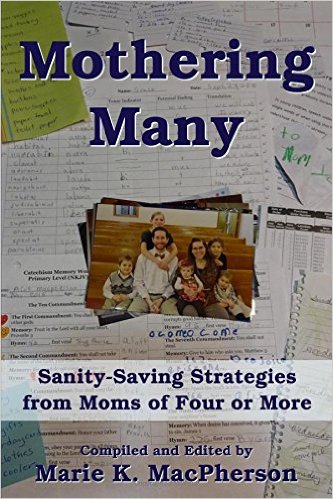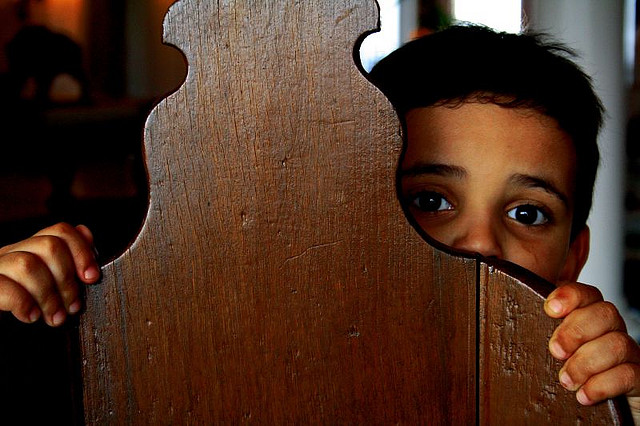Adoption and the Church as Family
By Dalas Mueller
Today is Gotcha Day for our sweet daughter, Hope. That is, the one year anniversary of my husband busting her out of her orphanage and making her our daughter forever. I didn’t expect to be celebrating today sitting across the room from my sweet girl as she lies in a hospital bed in the ICU, fighting off an infection and awaiting her third brain surgery since coming home.
But… I wouldn’t trade her for the world! And I could not be more thankful that she is in our arms for comfort and love as she faces her earthly trials. Other than God Himself, there is one entity that I immediately thank in my heart each time I consider the blessing of our adopted children – our congregation.
Without the amazing love of our beautiful church, we never could have taken the leap of faith to bring Jacob and Hope out of their lives of loneliness and neglect into the loving arms of their family. They truly went above and beyond in so many ways. In honor of the sacrificial love they have shown our family, I asked several other adoptive parents how their congregations have blessed them during their adoptions. (Some answered with blessings and others with disappointments.) My notes are added along the way with suggestions for adapting these examples to our unique Lutheran context.
Churches can either be the greatest hindrance to God’s command to care for orphans and widows, or they can be the greatest asset. My prayer for all of our churches is that we ask ourselves how we can bless families who step out in faith to become a father to the fatherless and an image of Christ’s love to the world.
Show – Tell – Sell
“[Our Church] not only allowed us to sell bracelets after/between Masses to help fund our adoption but for Pastor to mention directly from the pulpit with his support!!”
“They… allow us to sell / show / tell most anything in the front of church.”
“If a church would mention a fundraiser from the stage, that would be amazing…”
So, obviously, these suggestions are coming from a variety of Christian backgrounds, but let’s look at the meat of the discussion – what are the helpful elements and how can we apply them in our own congregations?
Most adoptive families, if they do not have the funds within their own financial or social capitol, will plan fundraisers to help them make up the difference in the cost of their adoptions. We did this and most internationally adopting parents I know do it as well. One adoption could easily be more than one year’s pay for your average, hard-working family. They may have the resources to care for another child, but they may not have the resources to throw $30-$50k at all the travelling and government red tape required to bring that child home.
There are two things in these parents’ statements that they need and are looking for: an avenue to showcase their fundraising efforts and for the leaders in the congregation to voice their support. When families know they will need to fundraise, they usually have ideas on how to go about that, it’s the support that’s needed! Be generous with your narthex area; allow families to place their adoption newsletters there or even items they are selling to cover adoption expenses.
Go the extra mile by having the pastor personally commend these efforts to the congregation. This can be done during the announcements or in the bulletin. I would suggest, if possible, that the pastor or one of the elders write the note or the insert for the bulletin. The family could do this, but the commendation is beneficial, not just for the family, but for the congregation as well.
Give Space, Give Time
“We did a ‘spare change’ fundraiser and a pancake breakfast for [the adoptive family].”
“Allow the church space for the dinners and such to take place.”
“Let fundraisers be held at the church without making the family feel like it would take away from the general church donations.”
“Our church was hesitant to help “publicly” as they aren’t able to help every family who is adopting but they quietly allowed us to use the kitchen/fellowship center for a spaghetti lunch on a Saturday afternoon and silent auction and provided all of the tables/chairs/linens/kitchen supplies/set up/clean up for us.”
“Sometimes being a Lutheran is hard when it comes to adopting, or at least that is how we feel. We have adopted four children with Down syndrome and ended up switching churches because of the lack of support. We shared our story with our church, we asked if we could use part of the building and have a spaghetti supper to help raise funds, we were told no, we were told that they do not support families that are adopting, they only will allow fundraising for things like the Red Cross or an organization, but not individuals or families. We were told we could not fundraise at all, even to use the church parking lot to hold a garage sale, at the church. We were allowed to talk for 2 minutes (They timed us) to share a fundraiser we were doing at a local kids jump place. No one from our church came at all. It was heartbreaking.”
“At a church dinner one night, an older gentleman approached me and said, “it looks like you’ve got it under control, but is there anything I can do to help?” That meant a lot. Just smile, say hello, let the family know you care.”
I have heard this time and time again. So many churches are reluctant to help families even by opening up their church space for fundraising opportunities. Now, I have heard legitimate reasons why this is not feasible, but most of the time the answer is no just because the congregation doesn’t want to make the commitment to serve.
This shows up in a congregation’s overall demeanor, like the family above who began their adoption journey in the Lutheran Church (I will say this sort of thing happens in all denominations) and really struggled. If it is literally not possible for a congregation to help by hosting or putting on a fundraiser or even just by letting their church’s space be used – do something!
Find something that can be done. Help brainstorm other facilities in the local area, come to other fundraisers that are being held. Show a genuine interest in the adoption. When a family is in need and reaching out to their church, it should be a safe place for them to go. It should not be a place where they feel like they will be rejected. We are the hands and feet of Christ to the world, but how can we do that well if we do not even serve one another?
Genuinely try to be a resource and a benefit. Just try! The trying is what matters most.
Adoption Funds
“Our church has an adoption fund. As long as the monies are there, the church gives $1000 towards financial need of adoption – domestic or international.”
“Our church has an adoption grant fund.”
“Our church supported us with prayer and a $5000 donation.”
For churches who are worried about the perception of fundraisers on church property for whatever reason, adoption funds are a great alternative. There are many different ways to set this up, much like any other specified fund, and it gives the congregation one specific financial way to support families.
Just an added note, please don’t be hesitant to support a family because you cannot give or publicly accommodate fundraisers for “personal gain”. Adoption is a great blessing to the family who is adopting, but it is also ministry. Most churches don’t think twice about hosting fundraisers for families with a medical crisis or a home that burned down. In addition, there are many non-profit organizations that the money can be given to that will hold the funds specifically for that family. We used AdoptTogether for our adoption and they were wonderful!
Practical Support
“I think having an adoption ministry for a bigger church would be great. It’s so hard when you are newly home.”
“Our pastor and his wife brought us a meal and checked on us which was sweet.”
“The biggest blessing, by far, is that a room was aside for a sensory space. Ethan can’t really go into any classroom setting at this point and church was getting non-existent for me. They’ve furnished it with lots of cool stuff and each week a couple volunteers to man it with him. It has been a HUGE deal for me and most weeks finds me in the hall in tears as I peek in the window and see men carrying 6 purses while Ethan removes and exchanges the ones he’s wearing! Or to see them helping him play reciprocal games or….whatever. They know him and they LOVE him… they are SO gracious and always tell me how they look forward to their week. Just huge.”
“We provide meals for families who adopt and those who foster. We have a very sweet family that has adopted two precious boys with PTSD and RAD and meals are still provided 3 years later as is needed.”
“Being very flexible regarding the needs of my kiddos (i.e., letting them go to developmentally appropriate sunday school classes instead of peer group, letting my older kids accompany them, etc).”
“If your family already has kids, volunteer to sit with the family in the pew and help by staying there to hold down the fort in case you need step out with your new addition to the family. This does not mean members should try to “entertain” your kids with gifts/food/crafts during church, mostly try to keep them from army crawling away, attacking siblings, or yelling for dad’s (pastor) attention Especially nice for pastor wives and single parents since we are otherwise left alone in the pew.”
As a church there are two main ways you can provide practical support to families after they have adopted – support on the home front and support at church. On the home front meals are the most practical, universal gift you can give. Some families would love to have date nights or extra helping hands, etc. But it is incredibly individual and specific depending on their child’s needs and their family’s situation.
It’s always better to be proactive on this front. What I mean by that is, so many members will feel compelled to help and ask what they can do. This can be really overwhelming and frustrating to the parents who honestly don’t know how to answer. Have an elder or a leader meet with the parents or send them an email letting them know that the church would like to help and what would they need.
That way a meal train or sign-up sheet could be organized and the parents don’t have the added burden of coordinating the care and help that they are receiving. Getting one step ahead of the flood of compassion and love can harness all of that in a way that is manageable and truly helpful to the family.
Emotional and Spiritual Support
“We didn’t realize how much the emotional support helps until with this second adoption we aren’t getting much.”
“A family in our church adopted… The birth mom chose to parent the DAY they were supposed to check out of the hospital. We PRAYED for them. When they came to church Sunday morning, our pastor asked everyone to gather around them and we PRAYED for them and hugged them and comforted them. THAT was more helpful than the money we raised. I think they appreciated the fact that we grieved with them and acknowledged their loss just as we have acknowledged other losses. Too often, I think adoption losses are overlooked by churches because they don’t know HOW to grieve that or support people in that.”
“We ‘lost’ our first. It was international and we didn’t find out until in country that there was a mess up on the paperwork and he was no longer available for international adoption. We did end up adopting a little girl. Everyone at home was like ‘oh well, at least you got her.’ We rolled with it, but it was hard to explain that we had fallen in love with a photo and a little boy we felt called to parent, prayed for, and wanted. While I can’t imagine life without my daughter, she does not ‘replace’ the son I lost.”
“[Our church does] meals/adoption showers through the lifegroups as they would for babies being born to the family.”
“Dont forget the “Baby Shower” no matter what age. It makes adoptive mom’s know their journey into parenthood is just as important.”
“Most helpful–welcoming my new little ones, not being critical or judgmental of my decision to adopt again as a single mom.”
“[Our congregation] didn’t help us at all. No one was even interested in emotionally supporting us, either. I think that even if they can’t help financially it is still an enormous blessing when a church’s leaders and congregation can offer emotional support and encouragement.”
“For several weeks after I returned families with new babies were recognized from the pulpit and introduced to the congregation. Week after week I sat there with my new little ones and no one ever acknowledged them. It happened before with some of my older kids who were adopted at birth. People just don’t think of adoption, I guess. But I really wish they would have just acknowledged my babies.”
“If the family who just adopted misses more services than they used to, don’t jump to conclusions that they don’t want to be at church! They are handling massive turmoil/trauma in their lives and the lives of their children which makes getting out a huge challenge. Instead of dismissing them for not being “dedicated enough” drop by with a meal and the bulletin from church or a copy of pastor’s sermon and let them know they were missed but that you understand.”
“One really neat thing that we did this week is one of the ladies is having to miss our summer book study because their adopted child is not to a place where he can handle the chaos of being around large groups of kids so she has been reading along in her book and we all text her or call her to chat about what we are reading.”
Notice something about this section? It’s my longest one! Out of all the comments I received, the bulk of adoptive parents’ desires were geared toward emotional and spiritual support. Not all congregations can help financially, and not every member is in a place to give practical care. But all of us are able to show love to the adopting families in our churches.
Most of all, adoptive families really just want to know that the congregation is standing behind them emotionally and in the gap for them with prayer. They want to know that you care about their child just as much as you care about every other child in the congregation. They want to know that church is a safe place for them and for their family.
Even if you can’t do anything else, this is huge and will be a blessing both for the parents and for their children. It’s as simple as giving love, in whatever way God has gifted you and enabled you to do so.
May we all seek to love one another deeply as Christ has first loved us.




2 Comments
Sweet Lou
We adopted our children internationally and individually as infants. They were welcomed by and raised in an lcms congregation. We would never have dreamed of asking for financial support, nor did we expect to be treated differently than families with biological children.
A Elizabeth
We did not consider the expenses involved in the international adoption of our daughter to be something that others should have to contribute towards, just as we would not have asked for assistance with the costs of the births of any of our biological children. It was our decision to adopt, and through faith, the Lord provided the assets necessary to enable us to follow through. We also did not consider adding a member to our family through adoption to be a ministry any more than parenting in general would be. Although this is a popular idea amongst Evangelical Christians, especially, we adopted because we desired to have a child, not because of charitable or evangelistic motives. Support to our family following the adoption similar to support a family with a newborn would receive was exactly what we needed and desired.